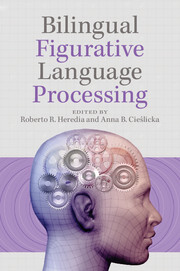Book contents
- Frontmatter
- Dedication
- Contents
- Contributors
- Acknowledgments
- Foreword
- Preface
- Section I Theoretical Implications
- Section II Methodological Approaches
- Section III Figurative Language Processing
- Section IV Cross-Linguistic Approaches and Applied Issues
- 10 Straight from the Horse’s Mouth: Idiomaticity Revisited
- 11 Anger Metaphors across Languages: A Cognitive Linguistic Perspective
- 12 Gauging the Semantic Transparency of Idioms: Do Natives and Learners See Eye to Eye?
- Author Index
- Subject Index
- References
10 - Straight from the Horse’s Mouth: Idiomaticity Revisited
Published online by Cambridge University Press: 05 February 2015
- Frontmatter
- Dedication
- Contents
- Contributors
- Acknowledgments
- Foreword
- Preface
- Section I Theoretical Implications
- Section II Methodological Approaches
- Section III Figurative Language Processing
- Section IV Cross-Linguistic Approaches and Applied Issues
- 10 Straight from the Horse’s Mouth: Idiomaticity Revisited
- 11 Anger Metaphors across Languages: A Cognitive Linguistic Perspective
- 12 Gauging the Semantic Transparency of Idioms: Do Natives and Learners See Eye to Eye?
- Author Index
- Subject Index
- References
Summary
Abstract
Idiomaticity has long been an area of intense research around the world. To date, many empirical findings have been disclosed and even more definitions and experimental tasks proposed. Yet little research accounts for the effect idiomatic tasks have on participants’ overall performance. The present qualitative study asserts that different experimental tasks and idiom sub-types have different effects on the comprehension/production of second language idioms and, furthermore, that qualitative data, combined with quantitative data, can supplement and complete more fully a researcher’s understanding of a particular issue under investigation than quantitative data alone. Pedagogical implications are discussed and future research directions explored.
Keywords: figurative language, idiomatic competence, metacognitive strategies, second language idioms, vivid phrasal idioms
Using the answers to two questionnaires given to 60 third-year adult learners of Spanish, French, and German, Liontas (2002a) has provided convincing evidence that
(1) learners do want idioms to be an integral part of their language and culture training; (2) they can predict their performances on idiomatic tasks and, finally, (3) they have very specific beliefs about the importance of learning idioms, the nature of idiomatic learning, and the strategies that are most likely to facilitate such learning (p. 289).
From the ensuing analysis of data, Liontas concluded that second language (L2) “instructors should introduce idioms more regularly and systematically to their students, regardless of the specific approaches they take to idiomatic learning” (pp. 306–307).
Information
- Type
- Chapter
- Information
- Bilingual Figurative Language Processing , pp. 301 - 340Publisher: Cambridge University PressPrint publication year: 2015
References
Accessibility standard: Unknown
Why this information is here
This section outlines the accessibility features of this content - including support for screen readers, full keyboard navigation and high-contrast display options. This may not be relevant for you.Accessibility Information
- 13
- Cited by
